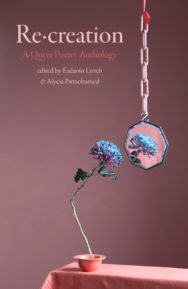‘You’ll find work that surprises you, that confronts you, and work that intrigues you.’
In 2021, supported by Creative Scotland, the Re·creation project invited anyone in Scotland and the UK to write poems, develop their craft, and build a community through workshops, round-table feedback and 1-to-1 mentorship. This anthology is the resultant publication contains new work from nearly 30 writers of the LGBT+ community across the UK, including Joelle Taylor, Mary Jean Chan, Nat Raha, Harry Josephine Giles, Patience Agbabi, Christopher Whyte, Dean Atta, Jay Gao, and Andrew McMillan. Below is an extract from the anthology’s introduction.
Extract taken from Re·creation
Edited by Éadaoín Lynch and Alycia Pirmohamed
Published by Stewed Rhubarb
Introducing Re·creation
For this anthology, based in Scotland and looking out to the UK and the rest of the world, it is only fitting to open with Nat Raha’s heartfelt tribute to Callie Gardner. Callie’s passing on 8th July 2021 was a shock to the literary and queer communities, and it had been our early intention as editors to invite Callie to participate in the anthology.
One of Callie’s last poems, ‘fifth letter / moonletter,’ writes about how ‘we go out roaming with a hangry heart.’ We hope the work you read here inspires you to be just as hangry, as forceful, and as kind as them.
Ways and Means
Re·creation borrows its title from a poem by the incomparable Audre Lorde, a self-described Black, lesbian, mother, warrior, poet. In her poem, the act of creativity is understood as pleasure, and pleasure itself an act of creativity. We chose this word not only for its commitment to Lorde, and the intersectional feminism she stood for, but also these ideas of play, refreshment, recovery, restoration, and invigoration.
With Edinburgh-based independent publisher Stewed Rhubarb Press, Re·creation invited queer creatives to write poems, develop their craft, build a community, and be published in a landmark poetry anthology. One of our aims was to respond to the Covid-19 pandemic, emphasising professional opportunities and networking during a time of isolation and financial distress for many. The anthology includes 29 poets— nine solicited poets, 20 selected from an open submission call. Final selections for the book were chosen by a team of seven altogether: the two co-editors, two guest readers, and three members of Stewed Rhubarb Press. From the open call, we received over 270 submissions (nearly 900 poems) and recruited our two guest readers to help select our final poems for the anthology.
Workshops, round-table feedback, and 1-to-1 mentorship were also part of the project, free to the attendees, and all contributors received a £100 fee for their published piece. Our development opportunities were intended to provide support to underrepresented groups and were all held online. Re·creation was built and run as a community building experience, one that allowed the contributors to continue pursuing creative goals after the project was completed.
Transparency and accessibility have been priorities from the outset and we were keen to build them into the process. For any poets who were not accepted from the open call, we offered editorial feedback, and provided it to over 70 respondents. To select work from the open call, we recruited two BIPOC guest readers to ensure fairness across our shortlisting. As part of our values of equality and accessibility, we ensured there would be no submission fee to offer work in the open call, and no requisite or expectation of prior publication experience. We set up a simple webform for the open call, and no cover letter, supporting statement, or CV were required. We also made some places available in our workshops for contributors from our longlist who had not been selected for the anthology.
We couldn’t achieve any of the aims of the project as a team of two alone. Our application to Creative Scotland was supported by letters from Stewed Rhubarb Press, the Scottish BPOC Writers Network, Gutter Magazine, and Lighthouse Bookshop. We are forever indebted to them. A small network of people simply willing to bet on an idea was all that made Re·creation happen, and it’s our sincerest hope that Re·creation has offered the same confidence and care for the poets within these pages and outside them.
Representing poetry
As we were preparing for this project, foremost in our minds was the ongoing barriers to success for those in the margins: writers of colour, writers with disabilities, women writers, writers with caring responsibilities, older writers, and those of religious minorities. According to a report from 2020, commissioned by the Scottish BPOC Writers Network, the lack of successful writers with a similar background to their own was ‘a particular challenge to 51% of BAME writers’ (as opposed to 21% of white writers). Additionally, as cited by the Royal Society of Literature in 2019, the most commonly cited challenges to a writer’s early life are the combined lack of financial income, time, and confidence.
Recommendations from these and other reports include: recognising structural inequalities, offering development opportunities to writers early in their career, understanding that no one demographic is homogenous, taking responsibility to address inequalities in the literary sector, and challenging views that suggest diversity and quality are incompatible. As we were fashioning the structure of this project, we took these recommendations to heart and aimed to prioritise equalities, diversity and inclusion along the intersections of our poets.
Our central focus—the development of queer voices and delivery of an anthology platforming their work—has always been fundamentally intersectional. As a project funded by Creative Scotland and based in Edinburgh, we are also delighted that it features poems in Scots and Gaelic. We are particularly proud that over half of this anthology is from BIPOC poets, that over a third is from trans* and genderqueer poets, and that we have poets of every adult age group.
There is always more to do to uplift and support anyone living in the margins. Re·creation was one small enterprise to that aim, running as a sustainable, ethical, replicable process. We hope that our measurable successes inspire and prompt others in the sector to pursue projects like this and continue to promote and encourage writers of all minorities.
The Anthology
Every anthology, whether attempting to encapsulate a snapshot or a comprehensive overview, will fail—and the failure is necessary. Neither attempt is attainable or, frankly, desirable. By nature of being a queer anthology, any parameters we set on subject or context are inherently porous and undercut. This means there will inevitably be gaps, lacunae, and absences in this book.
Though we are proud and thrilled to have such strong representation from BIPOC poets, trans* and genderqueer poets, and every adult age group, there should be more representation from poets over 45, poets based outside Scotland and the UK, poets writing in languages other than English, and poets with disabilities. Anthologies, ours included, are limited by constraints of book length, budget, page size, and time, in addition to issues of consistency and diversity. We sincerely hope our failures here will galvanise others’ to try and succeed. When we look back on this book in years to come, we will no doubt notice more absences and failures we don’t see now—and that shift in perspective is essential and right.
In our original aims, as well as our submission call, we claimed that we sought ‘personal poetry,’ written out of first-hand experience. Mostly, this claim was born out of the desire to centre queer voices, but not narrow into a niche theme. (We also couldn’t decide on just one theme anyway.) We were starting something new, during a Covid lockdown, and had several learning curves ahead of us. Trans poets in our community rightfully corrected us on the problem of asking for personal poetry, noting that their bodies are ‘already politically overdetermined,’ that their authenticity ‘relentlessly commoditised,’ and their visibility is ‘both trap and door.’ Our appreciation for such honesty can’t be overstated; because of this feedback, we amended the call to invite submissions that directly challenge visibility and commodification. We know that this expansion has made the anthology a better book, and Re·creation a better project.
Return
We encourage you to dip in and out of this book as you like. You’ll find unpredictable shifts in theme, style, form, and subject. You’ll find work that surprises you, that confronts you, and work that intrigues you. Some of the best experiences of reading are ahead of you: what you feel days or weeks afterwards. Moments when you’re undertaking a mundane task and a line comes back to you out of the blue and fills you up from your soles, or you notice something new that you remember reading about, knowing you wouldn’t have noticed it otherwise. Poetry is not often perceived as a democratic form, but in the house of Re·creation, we hope there is a poem for everyone. We wish you might find it in these pages.
When this book is published, it will join a range of queer poetry books that did not exist when Re·creation was first dreamt up. In 2021, Anamot Press published their poetry anthology The Sun Isn’t Out Long Enough, a book that transcends national borders and showcases queer experiences told without shame. 2021 saw at least three more collections of queer work, including Lifeboat Press, which published Queering the Green, an unprecedented collection of Irish queer poetry; Muswell Press, which published Queer Life, Queer Love, a collection of fiction, non-fiction, and poetry; and Arkbound, which published the Writing Our Space: An LGBTQ+ Anthology of essays, short stories and poems. In 2022, Vintage launched their anthology 100 Queer Poems, edited by our very own contributors Mary Jean Chan and Andrew McMillan, another book that transcends borders, and also time, as it celebrates both contemporary voices and visionary poets of the past. May there be many, many more.
Return to this book as often as you want & know you are always welcome. And in the words of one of our cherished guest readers, Harvey Dimond:
It was an honour to have this experience and to be able to read such a breadth and diversity of writing, much of which touched on issues and experiences that are close to my heart.
There are so many talented poets in the following pages, and I hope you enjoy reading their work as much as I did.
Éadaoín Lynch and Alycia Pirmohamed
Re·creation, edited by Éadaoín Lynch and Alycia Pirmohamed is published by Stewed Rhubarb, priced £10.00.
Co-editor Éadaoín Lynch is an Irish poet & researcher based in Edinburgh, whose work has been published previously in The Kindling Journal, the Fawn Press anthology Elements, and shortlisted for the Jane Martin Poetry Prize and the London Magazine Poetry Prize. Their debut pamphlet, Fierce Scrow, is forthcoming from Nine Pens Press in August 2022.
Co-editor Alycia Pirmohamed is author of the pamphlets Hinge and Faces that Fled the Wind, and co-author of Second Memory. In 2020 Alycia was the winner of the Edwin Morgan Poetry Award. Her debut poetry collection Another Way to Split Water is forthcoming with YesYes Books (US) and Polygon Books (UK) in 2022.
Stewed Rhubarb Press was founded in 2013, winning the Callum Macdonald Award for its first pamphlet, The Glassblower Dances by Rachel McCrum. Since then, they have launched 3 collections, 2 anthologies, and published 24 pamphlets, from writers including playwright Jo Clifford, Scottish poets Dr HJ Giles, Colin Bramwell, Hannah Lavery, and David Kinloch. Stewed Rhubarb is known for its wildly diverse list, authentic appreciation of the spoken-word scene, and high production values. Its mission is to treat spoken-word poetry with the enthusiasm and respect it deserves.
ALSO IN THIS ISSUE

 New Skin for Old Ceremony
New Skin for Old Ceremony
‘It was unsettling. No dread nor excitement, no fear nor quiet confidence. Nothing. Just a dull ackn …

 Creating Change: Lorraine Wilson on Rewriting the Margins
Creating Change: Lorraine Wilson on Rewriting the Margins
‘The aim is simply to give each writer two things: 1. A way forward with their writing, and 2. The c …













